On Poverty, Gentrification, Addiction, & Homelessness

The Precariat & the Expensiveness of Poverty
Over half of Americans are living paycheck-to-paycheck, with no substantial "rainy-day fund." 39% of Americans have almost no savings at all. They couldn't afford an extra 100 dollars in an emergency situation. Almost 60% of Americans have less than 1,000 dollars in savings. Most Americans can't afford to have a medical emergency or a significant unexpected expense. The proletariat has become the precariat, a class of people with no predictability or security—people who could very easily wind up homeless or in extreme poverty due to the slightest misstep or bad luck. The plight of millennials is precariousness and uncertainty about one's future well-being.
People who have never experienced real poverty generally do not realize how expensive it is to be poor. If your car starts making weird noises and you can't afford to get it looked at, much less fixed, then you ignore it. Eventually the car stops working altogether, then you have to come up with the money to get it fixed, and it will cost more to fix it at that point. If you can't afford to get your car fixed when it starts acting up, it will break down and you might have to get a loan to replace it with a new car. Since you couldn't afford a few hundred dollars in diagnostic and repair services from a mechanic, you are stuck having to spend even more money than that to replace the car. Now you have monthly payments too. So, you'll go get a second job, take out a loan, or whatever you have to do to come up with the money to fix or replace the car. For a lot of poor people, especially in areas with lousy public transit (or no public transit), a car is a necessity. So, you have no choice. If you can't afford to fix your car or buy a new one, you could lose your job. Miss a few payments and you could get evicted and end up homeless.
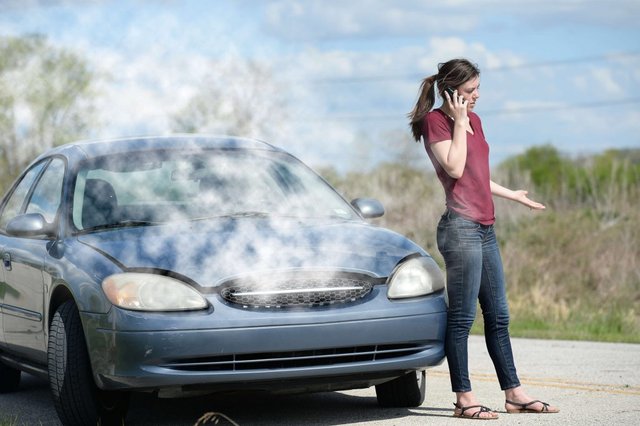
If you don't have good credit and money saved up for a down payment, you can't get a mortgage. This means that poor people often have to rent. Rent is always more expensive than a mortgage. The rent at the last place that I rented was 800 dollars a month. The place was kind of crappy: it was in a bad neighborhood—someone got shot in front of our house the night we moved in, later on we were the victims of an armed robbery because of the bad neighborhood, the landlord and property management company were lousy. When we moved out, the landlord kept our deposit for illegitimate reasons. Even though I was able to demonstrate that the state law prohibits the landlord from keeping a deposit for the particular reasons they provided, the landlord was able to illegally keep the deposit simply because we did not have the time and money to fight them in court. Fast forward to my next place. The mortgage in the new place was half of the rent at the old place, yet the house is nearly twice as large, much nicer, in a safer location, etc. When you are poor, you rent—and that makes housing twice as expensive!
If you are poor and lose your job, you could easily end up experiencing homelessness. Suppose that you lose your job due to an injury or temporary medical condition. By time you get better and get back to work, you already got behind on bills, got evicted, and started living on the streets. We are all in that same precarious situation, with homelessness lurking around the corner, just one unlucky event away. The bulk of us are in the precariat, pretending that we aren't just barely hanging on.
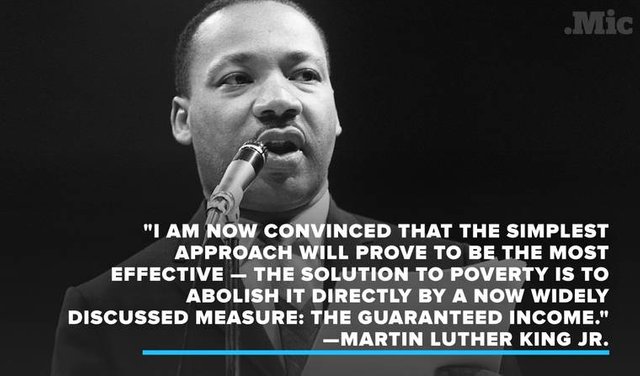
If you were to give everyone a basic income—not a lot of money, but just enough to cover the necessities—, then the situation of precariousness would be ended. Everyone would have the security of knowing that even if they are injured and lose their job, they won't lose their home and starve.
"Hold up! How are you going to fund a universal basic income!?" I'm getting to that, just wait.
Gentrification & Pricing Out Poor Folks
I recently saw something in the local news that said that local police statistics demonstrate that gentrification reduces crime. This is true, but only tautologically so. Gentrification is when businesses, capitalists, and land speculators invest in "revitalizing" a neighborhood, thereby driving up land prices and rent, effectively pricing poor people out of the community. As rent increases, the poor people move to cheaper neighborhoods and middle-class individuals move in behind them after they leave. Yes, gentrification leads to less crime in the neighborhood, but that's just because there's less poverty—but gentrification doesn't eliminate poverty; it just pushes poor people out into different neighborhoods. Most crime stems from poverty. Gentrification doesn't get rid of crime and poverty; it just moves it from one part of the city to another.
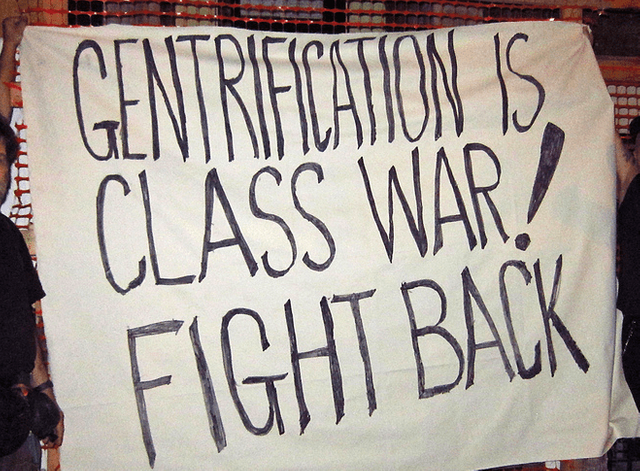
Having poverty-stricken neighborhoods is bad, but gentrifying those neighborhoods in order to make them "better" is also bad. Land value tax (LVT) and universal basic income (UBI) are good ways of eliminating the problems on both ends. Suppose you implement a land-value-tax-plus-basic-income scheme in a neighborhood that is experiencing "revitalization." The LVT takes some of the wealth generated by the "revitalizing," and the UBI gives some of that wealth back to the people that are already living in the community, that way they aren't priced out of the neighborhood. The basic income also serves as a form of welfare and an economic stimulus. It alleviates or eliminates poverty. By giving the members of the community a share of the wealth generated by rising land prices in their neighborhood, it allows them to have more money to spend in their own community. Instead of being priced out of the neighborhood by gentrification, they'll be pulled up and rise out of poverty as the community becomes more prosperous. Maybe people will even spend some of that money to pursue an education, start their own businesses, or even to engage in charity work—all things that they weren't able to do previously due to poverty. Unlike gentrification (pricing out poor people and replacing them with higher income folks), basic income actually helps to eliminate poverty.
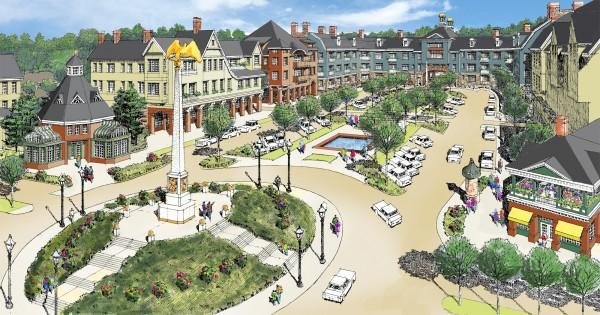
Land value tax encourages the best use of land, encouraging revitalization. Normally, a person can buy a $50,000 piece of land, hold on to it for 10 years, and then sell it at the end of the period for a greatly inflated price. Even if the owner does not make any improvements and contributes nothing to the value of the property, population growth and development in the surrounding area will drive up the price. So, the proprietor sells the property at the end of the period for $95,000. Assuming that the property taxes in his area are the same as those in my area, he will pay a total of $6,670 in taxes over those ten years. This leaves him with an unearned increase of $38,330. The increase in value was entirely the produce of the labor of others, the result of the municipality building infrastructure, roads, utilities, schools, etc. and the local community building stores, gas stations, groceries, restaurants, etc. The land speculator has successfully siphoned off $40k of socially produced wealth as his own private profit.
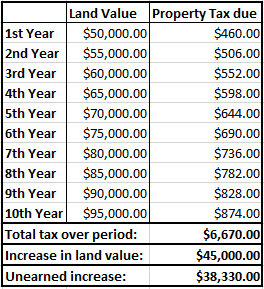
With a reasonable 6% land value tax, the situation changes drastically. Let's assume he buys the same $50,000 piece of land, holds it for 10 years and then sells at $95,000—an identical scenario other than it taking place under a different tax system. The speculators total tax burden over the 10 year period is now $45,000, so it actually costs him money to hold the property out of use for speculative purposes. Taxes now cut into profits, which means that the land speculator is better off selling the property sooner, so that someone else can either live there or use the property for productive purposes. If the person in the example above had sold the property for $70,000 after 5 years, he would have made a decent profit of $12,000 dollars. Currently, a land speculator would never do such a thing when he could hold off on allowing revitalization to take place in order to increase his profits upon sale. With a land value tax, however, such greedy behavior would actually reduce his profits.
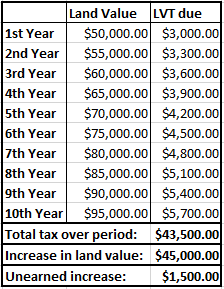
The above example dealt with a simple piece of land with no structures upon it. When we take structures into consideration, the situation becomes even more interesting. Under conventional property taxes, such as we have now, a speculator can actually increase his profits by letting structures become rundown in order to reduce his tax burden. Suppose that a speculator buys a $70,000 property—the land is worth $50,000 and the house on it is worth $20,000. The speculator holds the land out of use for 10 years, but takes no care to do maintenance and repairs to the house. Leaks and such cause the house to quickly depreciate in value until it is filled with most and totally worthless. Under the existing tax system, the proprietor is actually reducing his tax burden by refusing to do maintenance and repair, which allows him to hold the property out of use for longer. If he does do maintenance and repair, the tax burden might make it too expensive for him to hold the property out of use for so long. So, the incentive is for the speculator not to contribute any value by doing maintenance, repair, or renovation.
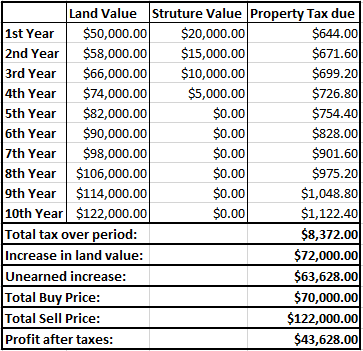
Under land value tax, however, the incentive is reversed. By neglecting maintenance and repair, the speculator is keeping himself from being able to make a profit. Under LVT, the property owner needs to actually create value in order to turn a profit! If the owner does not maintenance, repair, or renovation, he will make no money off of holding the land out of use.
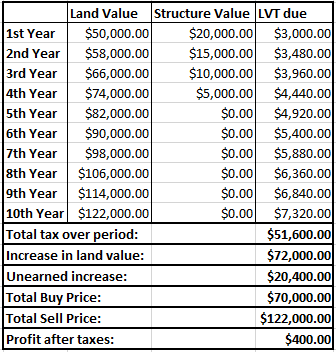
But, let’s suppose that the property owner does renovations, raising the value of his property. Under land value tax, he will not be taxed on the value of the structures, so the tax system encourages him to do maintenance, repair, and even do renovations to increase the value of his property. The renovations will not add to his tax burden. Compare the chart below to the one above. By doing renovations (i.e. by producing value), the property owner can turn a profit. However, he can make no profit by destroying wealth/value. All of a sudden, holding land out of use, letting a building get worn down and allowing urban decay to occur, just because you suspect that the land itself might be worth something someday, just isn't profitable.
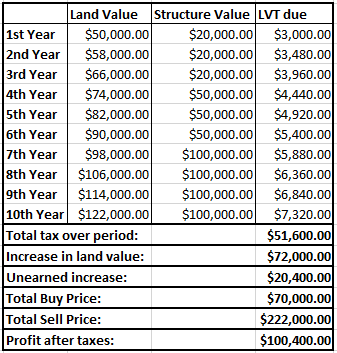
With land value tax, abandoned buildings wouldn't remain empty, they'd be quickly sold and put to good use, either as affordable housing or as businesses or bases for non-profits. The land value tax would induce revitalization, and the basic income associated with it would ensure that gentrification does not result from the revitalization. Land value tax discourages land speculation and prevents urban decay, it also encourages more New Urbanist style approaches to urban planning. Imagine a city that is pedestrian friendly, where grocery stores are within walking distance of residences, with good public transit, fewer cars, and a greater sense of community and belonging—that's New Urbanism.
If the LVT is not linked to a dividend to residents, then I would be in favor of a temporary LVT exemption up to a certain point for owner-occupied spaces. So, a owner-occupier gets a temporary homestead exemption for up to 2 acres and up to $30,000. As long as the owner lives in the property and is not renting it out or holding it out of better use, the owner would pay no LVT. However, when the owner sells the property and realizes a gain, then the LVT will be collected at the time of sale. Under this arrangement, you would pay no taxes on your primary residence unless/until you sell it. At the point of sale, you would pay all the LVT due from between the time of purchase and the time of sale. This would effectively allow people to go off-grid and live off the land much more easily if they wanted to. It would be feasible to just drop-out of the capitalist system altogether.

Land value tax and basic income can both be thought of in two ways. "Land value tax" is also called "annual ground rent" or "ground-rent" as Thomas Paine called it. This was actually the form of taxation that the American Founding Fathers originally put into the first American constitution. (Cf. Articles of Confederation, Article 8) In some sense, "land value tax" isn't really a tax at all. Under land value tax, land is really viewed as public property. People are only entitled to the product of their own labor. So, wages should never be taxed. However, land and natural resources are things to which a person is not naturally entitled. Income from rent and land speculation is unearned income, i.e. income generated from monopolizing land and natural resources. Thus, land could be viewed as the natural birthright of mankind as a whole. Land ought, then, to belong to the community. The "land value tax," therefore, is not a tax at all but a rent due to the rightful owner of land, i.e. the community. A "universal basic income" funded by land value tax has also been called a "citizen's dividend." In reality, the basic income is not a government handout or welfare payment, but an equal share to each member of the community of the rent. Each member of the community is an equal shareholder in the ownership of all land, and the citizen's dividend or basic income is just their share of the rental "profits." This model of ground-rent (land value tax) plus citizen's dividend (universal basic income) that I advocate was laid out by Thomas Paine in Agrarian Justice and partially adopted by the Founding Fathers in the Articles of Confederation. This was the society that the American revolutionaries were fighting for, a society with communal-ownership of land and no taxes. Ultimately, the Articles would be replaced by the modern U.S. Constitution. Just as the bourgeois "revolutionaries" removed the anti-slavery passages from the Declaration of Independence (cf. Thomas Jefferson's original draft), so too would they eventually throw out the popular idea of abolishing taxes and establishing public-ownership of land, with ground-rent charged for private use of public land as the means of funding democratic governance.

Thomas Paine's citizen's dividend funded by ground-rent—or universal basic income funded by land value tax—is a brilliant and just proposal. It finds its modern expression in Scott Santens and Martin Farley. I would suggest that you check out their works on the subject.
Furthermore, something like a libertarian municipalist (or democratic confederalist) approach to municipal politics might be beneficial. Having local/grassroots democratic people's assemblies, where the people deliberate and make decisions based on principles of participatory or direct democracy, would go a long way towards combating gentrification, even in the absence of a LVT+UBI scheme. The people living in a community have a right to a say in the direction that their community is heading in. Gentrification is very authoritarian, forced upon communities without the consent of the poor people who live there.
Homelessness, Addiction, & Giving Money

I recently had a rather frustrating conversation with some people who clearly don't understand poverty and have never experienced homelessness or spent time around people who are homeless. The conversation revolved around the relative morality of giving money to homeless panhandlers or beggars. I noticed several things during the conversation that were revealing. In our society, people like to blame the victims. As soon as you talk about helping the homeless, someone is going to suggest that most homeless people are homeless because they're lazy, they're druggies, or because they are just irresponsible. We blame the victims of poverty for their plight, just as our society tends to blame rape victims. "You obviously became homeless because you're a bad person (lazy, addict, wasteful, whatever)." "You got raped because you dress in a too revealing manner, or because you went outside in an unsafe neighborhood (your own bad decisions)." The land speculators, bankers, and venture capitalists that cause poverty are never to be blamed for their part in the matter, just as the rape victim takes the bulk of the blame and the rapist's role mostly gets ignored.
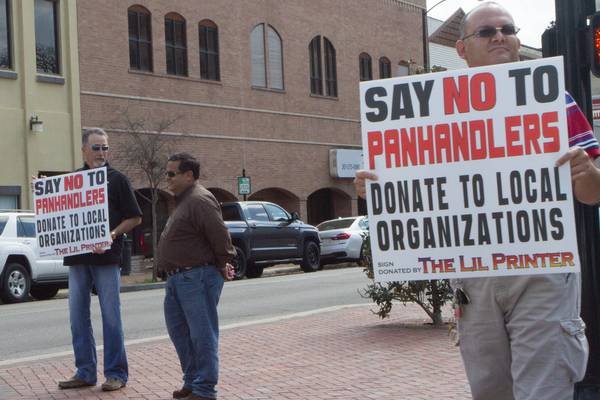
It was suggested that many (if not most) homeless beggars are actually alcoholics or addicts; therefore, one should not give them money because they will just waste it on alcohol or drugs—it's much better, they say, to just give them food instead. Also, one person commented that there are plenty of places offering free food and shelter, so panhandlers don't need money. This analysis misses the mark on several points. Firstly, food and shelter are not the only needs that people have. Sometimes people need medications, toiletries, contraception, STD screenings, feminine hygiene products, vaccines, etc. These are the kinds of things that church groups and charities generally do not give out. So, even though there are plenty of places giving out food, homeless people do still need money. Furthermore, sometimes people actually do need drugs or alcohol. The withdrawal symptoms for certain addicts (alcoholics, meth addicts, and heroin addicts in particular) can actually be so severe that they cause death; and death during detox is actually much more likely to occur if one is experiencing homelessness at the time. A lot of times, actual medical treatment at a rehab center is the only thing that can help someone survive through detox. So, those homeless folks that just "waste it on drugs or alcohol" might actually need drugs or alcohol to stay alive. Quitting cold turkey can, and often does, cause death, so sometimes a little "wasted money" that just got spent on alcohol actually does save a life.
Before judging addicts or refusing to give to a homeless person on the suspicion that they might be an addict, you should check out this resource on How To Safely Detox From Alcohol. Also, check out this video on heroin addiction and withdrawal symptoms:
After I pointed all of this out, my interlocutor asserted that there is free treatment available to addicts who are detoxing, so self-medicating with alcohol or drugs is not helping them at all. This simply isn't true! Getting into a treatment center is not easy. I know of absolutely no free treatment facilities for addiction. The treatment facilities that do exist have long wait lists; people often can't get into them. If you are homeless and don't have insurance, there's virtually no chance of you getting into any treatment program. Even if the homeless addict in question was lucky enough to get into such a program, it would likely take months to get approved and start. If they don't get alcohol or whatever drug they're addicted to in the meantime, they could die within a week. So, "self-medicating" by buying a little alcohol or scoring some drugs absolutely will help them.
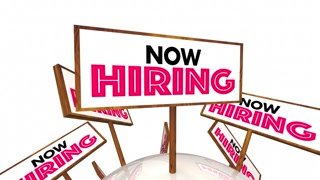
Another interlocutor interjected, pointing out that they have seen people begging on street corners right by businesses with "help wanted" signs. It would, they suggested, be very easy for the panhandlers to just get jobs, but they are lazy and trying to scam people. Plus, they suggested, there's plenty of places to get free food and shelter. However, as I noted above, food and shelter aren't the only things that people need. Even fast food restaurants have a tendency to not hire people that don't have access to daily showers and clean clothing. If you go into an interview and happen to smell bad and have on filthy clothes, you're probably not going to get the job. And most places won't hire someone that does not have a reliable mode of transportation and an address. (I actually once had a company refuse to hire me because they suspected that my truck wasn't reliable and that I might miss work because of it.) Furthermore, time spent working while homeless actually carries a heavy opportunity cost. If you are going to get access to the free resources that are available for homeless people, then you have to be at certain places at certain times. By taking that fast food job, you might miss out on several free meal opportunities at the park. At least until your first paycheck, you will be worse off for having gotten a job. Also, going to work may cause you to miss out on getting space in the shelter for the evening, so now you are stuck out in below-freezing weather all night. Now that you have a job, it's still going to take a while for you to save up enough to get an apartment, so having a job will make you worse off in the meantime. You may even find that your low wages aren't enough for you to get housing. So, now you have a job that takes up all your time, your wages give you less income than what you made from panhandling, and you miss out on some of the free resources that were available because you are at work when everyone else is in the food line or the shelter line. Maybe being homeless has caused you to lose your important legal documents (ID, Social Security card, birth certificate, etc.) and not having an address makes it nearly impossible to get that stuff re-issued. Such issues can make it difficult to even find a job. Or, perhaps, you had an accident or illness that caused you to accrue a bunch of medical debt. Maybe you also have child support and student loan debt, alongside the medical bills, and you know that getting a legit job will mean that your wages get reported, resulting in the bulk of the money going to taxes, debts, and child-support (garnished wages). So, out of rational self-interest, you decide to continue panhandling instead of getting a job, because you know that a job would just mean working hard all day and still remaining homeless and broke—begging is realistically the best option to ensure your own survival. "You can't pull yourself up by the bootstraps if you don't own any boots."
American capitalist society fosters prejudice against poor people, especially homeless people. There's a tendency among Americans to assume that poor people and homeless people got that way because they are basically just bad people. There obviously had to be something, some mistake that the person made, that led to them being in their current predicament. As I pointed out before, we are really all living paycheck-to-paycheck, one misstep or unlucky event away from homelessness ourselves. There actually are quite a few homeless people who do have jobs and still can't seem to "pull themselves up by their bootstraps" and rise out of poverty. And many people end up becoming homeless because of a disability or mental illness. Homeless people are people, with real lives. They have stories and histories. Seriously! I'm not making this up. Go volunteer with your local Food Not Bombs group and have some conversations with homeless people, hear their stories, and learn how they got into that situation. It is totally unconscionable that people harbor this conservative mentality that always tries to peg poor people and homeless individuals as the problem rather than as the victims. Perhaps that mentality is a coping mechanism, making it easier to get through the day without having to confront the fact that your society is garbage, riddled with systematic injustice, and that most of your friends and neighbors who go about their lives ignoring these problems are really morally bankrupt pieces of garbage.
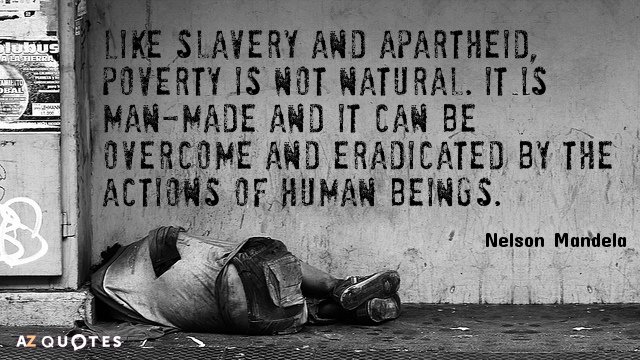
Maybe that person is homeless because they have PTSD from some crazy shit that happened to them when they were a soldier in Iraq, and that is what caused them to turn to alcohol; and maybe that mental illness keeps them from being able to hold down a stead job because they have random psychotic episodes that always get them in trouble. That's not theoretical or hypothetical: that's a real-world example of the situation of an actual homeless person.
When you judge people without knowing all the facts, that's called prejudice. Stop judging people when you don't know their story. You don't know the whole situation. If you can't spare any change, then don't give them any money, but shut the fuck up about it. Don't go around justifying your lack of charity as if not giving money to homeless people is morally superior.
"Why do you look at the speck of sawdust in your brother's eye, but fail to notice the log in your own eye? How do you say to your brother, 'Let me take the speck of dust out of your eye,' while there is still a log in your own eye? You hypocrite! First remove the log from your own eye, and then you may see clearly to remove the speck of dust from your brother's eye."—Jesus Christ (Matthew 7:3-5)
There's also that conviction among Americans that receiving something for nothing is inherently unethical. Receiving a handout is tantamount to a crime according to many people. In reality though, landlords and capitalists survive off unearned income by exploiting natural resources or inherited wealth. These same folks that despise the poor have no real problem with this, because rich welfare recipients are to be admired and poor welfare recipients are to be despised. Shit-bags like Donald Trump and Robert Mercer, who have never done an honest days work in their lives, live entirely off of unearned income from monopolization of land and capital. Somehow, I suppose, these men must be rendered deserving of their unearned income by the mere fact that they are megalomaniacal assholes. Heaven forbid that a homeless person stands out on a street corner on a cold winter day, enduring the shame and humiliation associated with begging, to earn their income though...because that's just wrong. This mentality is part of what is wrong with our society. Living off welfare as a poor person is looked down upon, but billionaires and large corporations get corporate welfare in the form of bailouts and subsidies, and the same people that despise poor welfare recipients don't really care. You see, conservatism is basically the idea that receiving handouts from the government is only unethical if you actually need the assistance. If you take government subsidies just because you're a greedy capitalist pile of shit, that's perfectly okay as far as conservatives are concerned. Personally, however, I don't give a shit about poor people that take advantage of welfare and live off of other people. Landlords and capitalists do the same damn thing everyday, living off of capital gains and rent, acquired through the monopolization of resources that really ought to belong to society as a whole, and that's a real crime! Rich people earn money without putting in any real labor everyday, and the money they acquire is greater than any welfare recipient or panhandler could even dream of, and conservatives have absolutely no problem with that.
Back to the conversation I was talking about. One of my interlocutors suggested that even people with disabilities have no excuse, because you can get government benefits. Furthermore, they asserted, poor people can just go on welfare. By this point in the conversation, I was already worn down and irritated, convinced that the people I was discussing the subject with were really just callous jerks. Anyway, in a calm and collected manner, I pointed out that homeless people can't get on welfare, nor can they get approved for disability benefits usually. Unless you applied and got approved prior to becoming homeless, you're probably totally out of luck. I know of people who have abused welfare programs, people who were perfectly capable of working, who had homes and cars and decent sources of unreported income, who received government assistance. Meanwhile, I know of several people with mental health issues that are either homeless or in-and-out of homelessness who can't get assistance. Even if a person has a home, getting assistance can be especially difficult or impossible if they aren't mentally capable of applying for welfare or disability.
The same interlocutor eventually said, "Well, what should we do? Just throw money at homeless people?" Well, basically, yes. However, we shouldn't just give money to homeless people: we should give money to everyone. Give everyone a universal basic income and fund it via land value tax. That's the solution to the problem of poverty. Landlords live off rent; spread the rent around and let everyone benefit from rent.
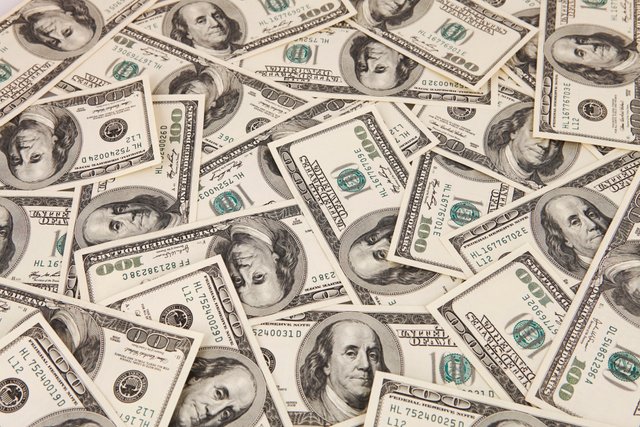
Dgain....such a wonderful post with true world political news by @ekklesiagora
Wel done snd execellent work sir...
Actualy I'm always respect to ur politics ideas...
Thanks sir..
Its too complicated for me, but if you can sell it to the folks, im in!
Giving money to people does not make you morally superior either.
1- The issue of universal basic income
As you may know, I have already discussed this issue with you, and I was rethinking the matter. Why not provide unemployment insurance and fulfill the role of universal basic income? in this way the minimum wage is eliminated, and then companies must pay a better salary if they decide to hire them.
2-The issue of land tax
This point also I think I have dealt with you. What makes you believe that the land sellers did not charge the buyer of the land tax to insure their profit? In any case, would it not increase the costs of those people who are using the land productively?
3-Poverty
There are many poor people who deserve to be poor, and there are many rich people who do not deserve to be rich. Most of the rich do not deserve to be, and most of the poor deserve to be, but the world is not fair, and redistributing wealth will not make it more fair. I have been at the bottom of the social ladder, I have seen how many people benefited from social medicine programs, direct income, education among many others, and anyway, all that is achieved is that they become dependent on that assistance Social.
"Giving money to people does not make you morally superior either."
Maybe not in certain instances, but generally it does. Minimizing suffering is the good. If you give a poor person some money and alleviate their suffering a little, that's morally superior to turning your back and refusing to help them. There might be cases where you can't afford to help, so you have an excuse, or whatever, but that's the exception.
"redistributing wealth will not make it more fair"
Actually, yes it will...by definition.
"What makes you believe that the land sellers did not charge the buyer of the land tax to insure their profit?"
Under land value tax, proprietors/sellers can't just raise the price in order to ensure their profits. If they raise the price, the taxes also go up. Higher land prices equals higher taxes, so it incentivizes people to sell the land for less.
Giving money is sometimes worse than turning your back on those people., the easiest thing is to give money and forget about them, give money will not solve the problem, the problem is that they are in a condition of poverty, that is what you have to change, how ? creating wealth, those same poor people that you give a few dollars to, then they go to a commercial and they buy anything and you know something? they probably end up buying something at a price higher than what it should cost, simply because the government has a tax on that product, just as it devours money with inflation, the best way to help someone is to make that person productive, Give him a job or create a system so they can get one. The State must lower taxes to increase the purchasing power of people, and so they will no longer have to live on paycheck-to-paycheck, taxes are currently paid to maintain the welfare state that does not work, and to pay an illegitimately contracted debt by the State, which keeps the bankers gaining fortunes and enslaving the people.
They would still live better with having much more money and a bit higher cost of goods compared to basically not having money at all. Just giving them money is naturally not enough, but it's still better than leaving people to starve, suffer, or die.
Ideally, we need to create a system that ensures that everyone has a stable footing in the world, where everyone could be secure enough economically/physically/free-time wise/psychologically/educationally, that they could participate in giving back to the society through the various type of labors that society truly needs.
We also need to make sure that the money doesn't accumulate in a way that it ends up just traded between a few powerful organizations/individuals that control society at large because that would be feudalism all over again, where the general economy either stagnate or people are severely exploited... as the few own the world that others have to pay a fortune to live in.
Basic income is a good step towards a more productive and happier society, as evidenced by the results from basic income pilots around the world: